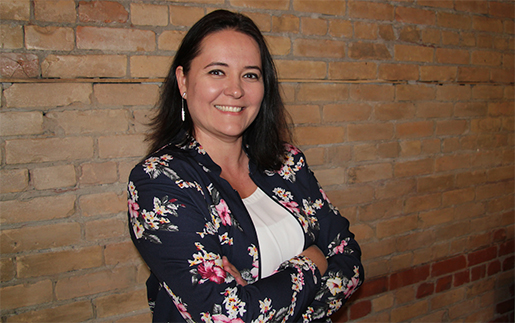Pivot from a Struggling Industry to New Opportunities: How to Make Your Own Success
In this edition, learn how a blockchain and AI application developer quickly adapted an existing solution focused on a challenged industry (oil and gas) to provide a much-needed solution for health care and other essential workers on the front line
of the COVID-19 pandemic.

Overview
Alberta, Canada, has the third-largest proven crude oil reserve in the world, after Saudi Arabia and Venezuela, so it makes sense that TerraHub Technologies, a Calgary-based application developer focused on blockchain and AI technologies, would target
the oil and gas industry for its automated verification solutions. But when COVID-19 (coronavirus) started to spread globally and impact the lives and careers of health care workers, TerraHub recognized that its Credential Link solution might have
a role in stopping the spread of the dreaded virus. The company adjusted operations, including sales, marketing, and technical teams, to focus not just on a new opportunity—but a new way to think of its business.
Challenge
Around the time COVID-19 was beginning to spread more rapidly in North America, TerraHub’s bread-and-butter base, the oil and gas industry was hit with another shockwave. Saudi Arabia and Russia were engaged in a bitter price war with each other, facilitating a 65% drop in the price of oil. The ramifications were felt all across Western Canada, where the oil and gas industry traditionally has been the lifeblood for many businesses.
“The price dropped to $20 a barrel in the U.S., and $5 a barrel in Canada. Oil companies had to curtail their operations. That put pressure on all the businesses and markets supporting the oil industry—including technology companies,” said Elena Dumitrascu, CTO of TerraHub and a member of CompTIA’s Blockchain Advisory Council.
That’s when TerraHub’s senior leadership got together and brainstormed. What could they do? Where does opportunity lie? The team believed in its blockchain and AI solution, and that it had more universal applications than oil and gas, but in what industry, and how should it proceed?
“We had to think about how we would survive as a tech company whose major focus was on an industry that was struggling. We had to dream a little,” Dumitrascu said.
“Health care providers are dealing with a lot of stressful stuff right now. It’s our job to make it less burdensome for them.”
Solution
In a series of meetings, TerraHub broadened the concept of a product that verifies the attributes of employees—critical to oil and gas clients that send workers to remote, classified and potentially dangerous areas. The spread of coronavirus was accelerating, and it became increasingly critical for health care facilities to know that front-line staff was healthy and safe in their work environments.
“We have this module called Fit for Duty that could be applied relative to COVID-19 health checks. We knew we could take what we have and put it to good use, so we went back and retrofitted the solution with new questions applicable to health care workers,” Dumitrascu said.
Next, the sales and marketing teams collaborated on a one-pager that talked about the core properties of TerraHub’s solution and why it was relevant for health care and other essential workers in the COVID-19 world.
Finally, TerraHub started reaching out to existing clients in the health care, safety and regulatory spaces to help fill in gaps in both messaging and the solution.
“We wanted to find out if companies could verify that essential workers were healthy, would they integrate a solution like this. It took three weeks to take it to market. In some ways, it felt like six months because we were working seven days a week, 14 hours a day to put the pieces together,” Dumitrascu said.

Outcome
Opening a new market and creating a new opportunity can be like trying to make all the pieces fit in a complex puzzle, Dumitrascu said. The key is to work together and consider everyone’s point of view—including potential customers. “We
really did want to help out, but we knew it had to come from a place of empathy. We’re licensing it at cost. We’re not looking to profit from it right now.”
TerraHub has pitched it to several health care companies and other industries with essential workers and it’s generated a lot of interest and buzz. “Essential workers need to provide their patients and their company proven documentation that
they’re healthy so that they can get to work. Right now, we’re going through some privacy audits with a couple of companies, but we believe this will be a benefit to the market,” Dumitrascu said.
The key is to be patient and be able to clearly articulate the value to prospects. “It’s easy to get lost in a lot of noise and you have to remember that even though this is an incoming opportunity, health care providers are dealing with a
lot of stressful stuff right now. It’s our job to make it less burdensome for them,” she said.
Post-coronavirus, there are plenty of other markets for TerraHub to target too. “We’re in a moment of time where trust matters and the verity of data matters, but the system that gives you immutable data via blockchain doesn’t matter
what the attributes are—only that there are attributes to manage,” Dumitrascu said.
Summary

TerraHub made big bets on its verification solution in the oil and gas industry—with great success initially. But when that market trended downward, the company knew that something had to be done. Coincidentally, health care companies and workers
on the front lines of the COVID-19 pandemic needed to prove negative testing for the virus in order to continue to support patients.
When it comes to adapting an existing solution to a new opportunity or new market—quickly—the key is to move fast but also make sure the whole company is in sync, Dumitrascu said. Don’t be afraid to make bold decisions, expand in a different
direction and look beyond your current borders or capabilities.
“We’re an early-stage company so that allowed us to put aside all the internal red tape. We were able to say, ‘Let’s dream,’” she said. “Our first conversation with a prospect was on the fifth day after coming
up with the plan. Just be creative and let everybody come forward and contribute.”
What's Next
While the focus on health care clients will be paramount as long as the COVID-19 pandemic is still active, TerraHub’s leadership believes that its core solution can be applied universally across a multitude of industries.
“Blockchain and immutable ledgers provide a provable, verifiable record of data that has almost unlimited uses. Our solution is not just for health care workers, but all companies in the service industry that have people as assets,” Dumitrascu said.
After all, a business’s ability to protect its employees, customers and data will never be anything less that absolutely critical to success and trust in the market. “That’s a big part of our society right now, right? How can you enable more trust? Having a solution that providers a source of truth is all about enabling that trust—in any market.”
Now It's Your Turn
A confluence of global events led TerraHub Technologies to spring into action and find a new opportunity. While most tech companies may not be able to help reduce a health care crisis, they can adjust their business toward a new area of growth by following these steps:
- Recognize your dependence on a challenged market or industry and huddle to consider alternatives.
- Dare to dream. Evaluate your current solutions/technology to determine how it might be used or applied in a new way.
- Develop a plan that fosters collaboration and unity among your disparate departments and teams, clearly communicating your strategy so that everyone buys in and can accomplish their part in a timely manner.
- Don’t stop. Hit the ground running to showcase the value of your new solution and begin thinking of what other paths you may be able to take in the future.
Read more about Technology Solutions.




 Download Full PDF
Download Full PDF